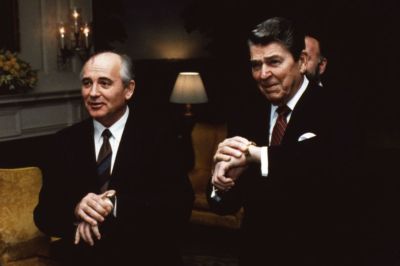One cheer for Mikhail Gorbachev

Mikhail Gorbachev was the last leader of the Soviet Union, ruling from 1985-1991. Since his death a few days ago, we have seen many articles praising Gorbachev for his role, along with President Ronald Reagan, in “ending the Cold War.”
Let it be stated clearly — “they” did not end the Cold War. America, under Reagan’s leadership, won the Cold War, and Gorbachev realized this and acquiesced to the inevitable.
Reagan was the first American president to come to office who understood that the Soviet Union was not only an “evil empire,” but that the Soviet Union was not the emerging future and was destined for the “ash heap” of history.
All the previous presidents (Truman, Eisenhower, Kennedy, Johnson, Nixon, Ford and Carter) to varying degrees were dedicated to coexisting with the Soviet Union and containing its malign influence in the world.
Reagan came to office believing that the Soviet Union was a spent force, a decaying empire “hollowing out” from the inside. For example, Reagan understood that the Soviet Union was expending a staggering amount of money on its military (perhaps half of its entire economy), whereas the U.S. was spending about 6% of its federal budget on defense. Reagan understood that America and the Soviet Union were in an arms race and we were jogging while the Soviets were sprinting.
President Reagan reasoned that if we increased the pace, even slightly, the Soviets would soon completely wreck their economy trying to keep up. The “Star Wars” initiative really upped the stakes. Gorbachev understood that Star Wars would make their missiles obsolete before they could steal the technology and duplicate it the way they had with the atomic bomb.
Shortly after Gorbachev’s ascension, Prime Minister Margaret Thatcher went to Moscow on a diplomatic mission. She returned and told Reagan, “This is a man we can deal with.” She recognized in Gorbachev an understanding of the wider world that had seemed to allude previous Soviet leaders. Gorbachev had also looked at the U.S.S.R.’s financial books and knew the Soviet Union was bankrupting itself.
Gorbachev tried to open Soviet society at least partially, with his glasnost (the fact of being public or wider dissemination of information) and perestroika (restructuring). While this greatly encouraged the Soviet population, the Communist ruling class detested and feared the reforms.
Gorbachev was desperate to reduce defense expenditures in order to reform a stagnant, moribund economy. Reagan sensed an opening and the two ended up meeting at a historic summit in Iceland in October 1986. While the talks ultimately collapsed, the remarkable progress that had been made led to the breakthrough represented in the 1987 Intermediate Range Nuclear Forces Treaty between the United States and the U.S.S.R. This treaty signified the beginning of the end for the Cold War and the Soviet Union.
Make no mistake — what happened was not inevitable. Reagan’s aggressive and assertive policies, economically, politically and militarily, gave the Soviet Union a good hard shove onto that “ash heap” of history.
Perhaps Mikhail Gorbachev summed it up best himself when he later explained that “Reagan genially led him to the edge of the abyss, then calmly asked him to take ‘one step forward.’”1 Derek Leebaert’s book is an exhaustive history of the Cold War by one of the first historians to have access to the Kremlin’s declassified archives.
Without Reagan’s multifaceted offensive, the Soviet Union could have tottered on for another decade or so, denying basic human rights to its own citizens and exercising a pernicious influence in the world.
The Soviet Union’s sudden collapse was shocking and the fact that it was as peaceful as it was is virtually unprecedented. I had the privilege of having the marvelous Dr. James Billington as a professor when I was a Princeton freshman. Dr. Billington’s specialty was Russian history (he lectured in Russia on the subject before he was 30). He was a great teacher whose lectures remained with you. I saw Dr. Billington many years later while he was serving as head of the Library of Congress.
I reminded Dr. Billington that he had predicted (in 1966 no less) that the Soviet Union would inevitably implode. He thanked me for remembering and seemed pleased that I had kept the notes from his course (and I still refer to them). He answered, “Yes, but I never thought it would happen this quickly, and I am stunned that it happened so bloodlessly.”
Therein lies the reason for one cheer for Gorbachev. In the end, he was not willing to use brutal and extremely repressive measures to maintain the Communist Party’s grip on power. There was an abortive coup to remove Gorbachev from power and to perpetrate this totalitarian regime (they had ordered 500,000 pairs of handcuffs to use on those to be arrested).
Gorbachev should receive full credit for his unwillingness to cause great harm and suffering to his own people to perpetuate a failed empire. For that alone, we should give him one well-deserved cheer.
The three cheers, “Hurrah, Hurrah, Hurrah” should be reserved for the true hero of the Cold War’s ending: Ronald Reagan.
1.Leebaert, Derek. The Fifty-Year Wound: How America's Cold War Victory Has Shaped Our World. Back Bay Books, 2002.
Dr. Richard Land, BA (Princeton, magna cum laude); D.Phil. (Oxford); Th.M (New Orleans Seminary). Dr. Land served as President of Southern Evangelical Seminary from July 2013 until July 2021. Upon his retirement, he was honored as President Emeritus and he continues to serve as an Adjunct Professor of Theology & Ethics. Dr. Land previously served as President of the Southern Baptist Convention's Ethics & Religious Liberty Commission (1988-2013) where he was also honored as President Emeritus upon his retirement. Dr. Land has also served as an Executive Editor and columnist for The Christian Post since 2011.
Dr. Land explores many timely and critical topics in his daily radio feature, “Bringing Every Thought Captive,” and in his weekly column for CP.






















